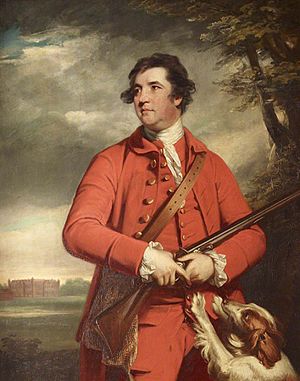Sir Charles Davers, 6th Baronet facts for kids
Quick facts for kids
Sir Charles Davers, 6th Baronet
|
|
|---|---|

Sir Charles Davers by Joshua Reynolds
|
|
| Born | 4 June 1737 |
| Died | 4 June 1806 (aged 69) |
| Buried | St Nicholas Church, Rushbrooke |
| Father | Sir Jermyn Davers, 4th Baronet |
| Mother | Margaretta Green |
| Occupation | Army officer and politician |
Sir Charles Davers, 6th Baronet (born June 4, 1737 – died June 4, 1806) was an officer in the British Army. He also became a politician and served in the House of Commons from 1768 to 1802.
Early Life and Army Career
Charles Davers was the second son of Sir Jermyn Davers, 4th Baronet and Margaretta Green. His father was also a Member of Parliament. Charles grew up at Rushbrooke Hall in Suffolk, England.
He went to school at King Edward VI School (Bury St Edmunds). Later, he studied at Trinity College, Cambridge, and finished his studies in 1755. After college, he went on a long trip around Europe, which was called the Grand Tour back then. It was a common way for young noblemen to learn about art and culture.
In 1758, Charles joined the British Army. He became an officer in the 44th (East Essex) Regiment of Foot. He fought in North America during the Seven Years' War. In 1761, he was promoted to Captain. By 1766, he was stationed in Ireland and became a Major.
Becoming a Politician
In 1763, Charles Davers inherited a special title called a baronetcy from his brother, Sir Robert Davers, 5th Baronet. This also meant he took over his family's lands and wealth.
In 1768, he was elected as a Member of Parliament for Weymouth. A Member of Parliament (MP) is someone elected to represent a group of people in the House of Commons. This is a very important part of the British government.
Later, in 1774, he became the MP for Bury St Edmunds. He kept his seat in the House of Commons because he was good friends with Augustus FitzRoy, 3rd Duke of Grafton. The Duke of Grafton encouraged him to use his family's influence in Bury St Edmunds.
Charles Davers often spoke out against William Pitt the Younger, who was a powerful politician. However, he did not join a specific political group called the Whigs. He preferred to remain independent and make his own decisions.
Later Life
Sir Charles Davers lived at Rushbrooke Hall. He passed away on June 4, 1806, his 69th birthday. He was buried at St Nicholas Church in Rushbrooke.
When he died, he left his estates to his nephew, Frederick Hervey, 1st Marquess of Bristol. Since he did not have any legitimate male heirs, his baronetcy title ended.
 | Jewel Prestage |
 | Ella Baker |
 | Fannie Lou Hamer |

